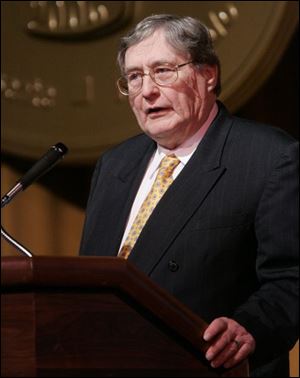
UT putting $10 million in economic development
11/18/2008
Jacobs
The University of Toledo is putting its money where its mouth is in terms of economic development for the region.
The university is transforming the UT Science and Technology Corridor in name and scope, and infusing $10 million to jump-start its efforts.
"I believe the modern economy, as we envision it, is absolutely dependent on universities," UT President Dr. Lloyd Jacobs said. "There is almost no hope of an economic turnaround without universities taking a role in it."
Ohio's governor and the chancellor are of the same mind, Dr. Jacobs noted.
The UT Science and Technology Corridor will now go by Science, Technology, and Innovation Enterprises, or STI Enterprises for short.
People got hung up on the geographic boundaries of the corridor and the new name envisions the broader scope of development, said Mary Jo Waldock, special assistant to Dr. Jacobs for economic development.
"We can take additional active participation in the development of our community," Ms. Waldock said.
To do that, the university is investing $10 million in STI Enterprises, which will be a nonprofit organization, as is the organization of the current science and technology corridor.
The money comes from UT's auxiliary services account, which includes money from items such as the commission it makes from vending machine sales, contracts with Barnes & Noble, and food service operations, explained Scott Scarborough, UT's senior vice president for finance and administration.
None of the money is from tuition and fees students pay or state money to the university. The $10 million is the accumulated amount over time from the auxiliary services, Mr. Scarborough said.
The current state of the national and local economy put more of an emphasis on the university to step up and put these resources toward the future, Ms. Waldock said.
"It's put an even more compelling pressure on us to do everything we can to use the knowledge resources of our university," she said.
According to a resolution approved unanimously yesterday by the UT board of trustees, the funding will be used "to provide services and to make loans and equity investments in public projects and private businesses."
No money will be spent until the corridor's articles of incorporation and code of regulations are amended for STI Enterprises, and all spending will be authorized by the organization's board of directors.
UT will be the sole member of the nonprofit organization.
The initial step of moving the money is "virtually risk free," Dr. Jacobs said, because the dollars remain in the custody of the university, where they will stay.
Dr. Jacobs said the reform and yesterday's action of putting the money behind it are the next steps in the progression of the science and technology corridor, which was started by his predecessor, former UT President Dan Johnson.
Mr. Johnson's corridor idea was announced in January, 2003, as a way to encourage collaboration among institutions on large-scale projects.
The corridor has changed in name and scope several times.
It went from a broad area proposal spanning south to Bowling Green State University and over to Owens Community College, to a more focused geographic triangle connecting UT's three campuses. There also was talk at one time of a light-rail system to move people through the corridor.
The university continues to explore the best ways to focus its economic development activities as the corridor continues to evolve.
UT has hired the consulting firm of Eva Klein & Associates, based in Great Falls, Va., for $254,000 to help UT work with the region to compete in the new knowledge economy.
Ms. Klein gave a presentation to the trustees yesterday about the transformation from an industrial economy to an innovative economy, in which universities can play a huge role.
"The depths of the transformation is really upon us now," she said. "We have to invent our future."
Eva Klein & Associates will continue to work with the university through the beginning of next year as it investigates how UT can best work with the region, area businesses, government, the state, and other entities to promote an innovative economy in the Toledo area.
"This university is poised to pull ahead," she said. "The ingredients are here."
Contact Meghan Gilbert at:
mgilbert@theblade.com
or 419-724-6134.